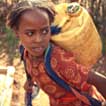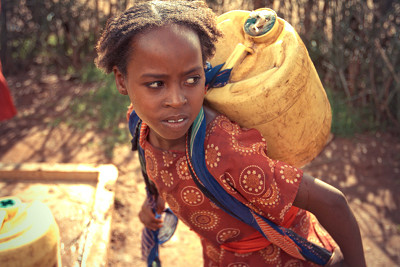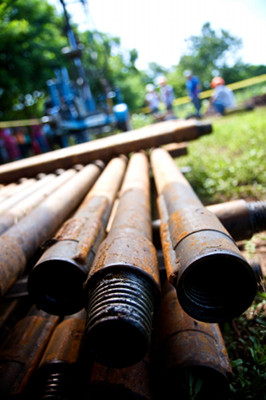Watering and Planting
The Interplay of Water and Church Planting in West Africa

Much of my career has been focused on implementing WASH (Water, Sanitation and Hygiene) programs in three African countries and consulting on others in Asia and Latin America. Many Christian implementers of WASH programming truly want to integrate their efforts with the gospel. But it is not always clear how that should look. Attempts at developing spiritual components to WASH programs often include things like regular staff devotions, Bible studies or adding evangelism and discipleship personnel to the team.
My journey has led me to explore spiritual intentionality beyond simply adding spiritual components to water programs. The catalyst for this is one phrase from Christ’s Great Commission in Matthew 28 where Jesus says, “Therefore go and make disciples of all nations... teaching them to obey everything I commanded you....” The phrase “teaching them to obey everything I commanded you” speaks to me of the ultimate goal of gospel ministry. To truly integrate gospel ministry with water development, can we stop short of making our objective the establishment of fully trained disciples and the planting of churches?
The following is a discussion of lessons learned while trying to join two outcomes: the implementation of excellent WASH programs and the multiplication of churches. There is much more to discuss and learn, but I prayerfully hope this encourages dialogue and leads to greater spiritual impact through water development.
Maintaining Two Goals with Equal Intentionality
Christian relief and development organizations often don’t adopt church planting as their mandate. Their expertise lies in developing sustainable, viable and transforming programs that impact the poor, vulnerable and needy. They employ experts in behavior change, monitoring, programming, water development, health, and agriculture. Most team members have little practical experience with spiritual ministry or in planting churches. They often see the need for addressing spiritual development, but have trouble knowing how to do it.
Christian mission agencies and churches, on the other hand, often focus on church planting, but struggle with all that goes into thoughtful community development. The many needs for clean water, good hygiene, and adequate sanitation push them to engage in WASH activities, but the complexities of doing it well are not easy for them to manage. Activities like catalyzing lasting behavior change in hygiene, initiating self-help methods of latrine construction, establishing viable water committees, creating local supply chains for spare parts, training local technicians to support themselves, avoiding dependency, and walking with the community until these important pieces are really established, seems beyond their reach. Is it even possible to do both water development and church planting with excellence?
 Two years ago, I was a part of developing a strategy to open up a new field of outreach in a very poor West African nation. Our initial baseline surveys revealed that this particular region had a population of 65,000 people and their primary needs were for water, food, and health. We also discovered that there were absolutely no churches or Christians in any of the villages, and that the locals were predominately nominal Muslims. The neighboring regions had a few Christians and churches that were excited about partnering together with us to reach this physically and spiritually needy region.
Two years ago, I was a part of developing a strategy to open up a new field of outreach in a very poor West African nation. Our initial baseline surveys revealed that this particular region had a population of 65,000 people and their primary needs were for water, food, and health. We also discovered that there were absolutely no churches or Christians in any of the villages, and that the locals were predominately nominal Muslims. The neighboring regions had a few Christians and churches that were excited about partnering together with us to reach this physically and spiritually needy region.
Working together, the church provided us with trained church planters, who we in turn intentionally integrated into our hygiene promotion, emergency feeding and livestock programs. These local evangelists seamlessly engaged in meeting both the physical and spiritual needs of the people. They also intentionally developed plans to share Christ in a culturally appropriate way with each household in the villages we served. The technical staff worked alongside these evangelists to coordinate integration and maintain focus on excellent programming. The regional team knew from the beginning that we had two equally important and vital goals: 1) Addressing the need for water, food and better health with excellent programming, and 2) Planting vibrant, evangelical churches. We knew the importance of both goals and we developed outcomes and indicators that provided a pathway to accomplishing both (Yes, you can develop spiritual outcomes and indicators!). Through the power of the Holy Spirit, God used these efforts to see many come to Christ and two fragile churches were birthed. Leaders are now being discipled in their faith and are being connected to our partner churches. We were also able to see significant physical impact in the lives of those with whom we worked through increased access to clean water, improved health and hygiene practices and enhanced resilience to food insecurity.
Developing the Team in Both Disciplines
Holding two goals with equal intentionality will never be realized if leadership isn’t in full agreement of the importance of each. But reality is that people tend to do the things for which they are trained in and neglect the areas for which they have no expertise. Jesus highlights this in Luke 6:40 when he says “The student is not above the teacher, but everyone who is fully trained will be like their teacher.” The key is then to design a conduit that gives leaders knowledge of both water development and church planting.
More than twenty years ago I had the awesome privilege of working alongside a young man in Ethiopia named Fikre. Fikre had technical training as a water technician and also had the spiritual gift of evangelism. I was amazed by the seamless integration of Christian witness into his day-to-day role as water team leader. Whether helping community volunteers digging trenches or constructing spring catchments with local laborers, he had a God-given ability to share Christ with those around him. As a result, dozens of people came to faith in Jesus and a growing church was established in that region. He was a wonderful example of integrating water and church planting until the Lord took him home at a relatively young age.
Since working with Fikre was my first experience in ministry overseas, I thought it was imperative that I find staff with this unique gift-mix of evangelism and water development. But in the years and decades to follow, God never brought anyone quite like him into my life. I was forced to figure out how to make it work with both technical types and ministry types working together toward common goals. I had to develop creative ways to train and disciple water staff to gain an appreciation and love for church planting. I also had to walk alongside ministry staff to train and develop in them an appreciation for excellence in water development. A few times, I had to go through the painful process of releasing those who through their actions demonstrated that they really had only one of the goals at heart and were thwarting progress. But when we persevered in this goal of developing in everyone a heart for both water development and church planting, God seemed to bless our efforts.
Walking with the Community Until it Works
As the world quickens its pace through improved technology and instant communications, expectations are increasing along with it. We want to do more, for less and in shorter periods of time. This is true of the relief and development world that is bounded by donor preferences, budget years and planning timetables. NGOs are forced to monitor impact and produce measurable results after a certain period of time or potentially lose funding. Mission organizations are feeling the pressure too…to see spiritual results quickly or move resources to more responsive fields. This is not all bad. We should be held accountable for our work and not be allowed to continue plugging away on projects that are not bearing fruit. But the other side of the issue is that a better future takes time to build. Local communities and churches don’t always develop at the same pace as budgets prescribe.
All of these pressures to predict, produce and publish results can fly in the face of seeing excellent development and church planting accomplished. Each community is unique and will need to follow its own path to sustained change – spiritually and physically. And we need to be patient since this process often takes years. Any short-cuts will only produce artificial results that satisfy headquarters and donors but don’t bring about
true change.
 While doing water development and church planting among Muslims in northern Cameroon, our team worked hard to progress at the same pace as the community. This was not always easy and there were times when it took years for a community to be ready. In one instance, villagers told us that they were waiting for the chief to die before constructing their water well because he wasn’t convinced that their contaminated source made them sick. In other places, the community was active and worked diligently to realize a water project within a few months. At times, we pulled the community along before they were ready in order to complete the project by deadline. But whenever we did that, it became clear months down the road that proper foundations of belief and trust had not been laid and the community was not maintaining their water source. On the church planting side, we sometimes struggled with moving too quickly before critical foundations were laid and the leadership established. And the results were often negative for the young church. Patience and perseverance is needed to reach each goal.
While doing water development and church planting among Muslims in northern Cameroon, our team worked hard to progress at the same pace as the community. This was not always easy and there were times when it took years for a community to be ready. In one instance, villagers told us that they were waiting for the chief to die before constructing their water well because he wasn’t convinced that their contaminated source made them sick. In other places, the community was active and worked diligently to realize a water project within a few months. At times, we pulled the community along before they were ready in order to complete the project by deadline. But whenever we did that, it became clear months down the road that proper foundations of belief and trust had not been laid and the community was not maintaining their water source. On the church planting side, we sometimes struggled with moving too quickly before critical foundations were laid and the leadership established. And the results were often negative for the young church. Patience and perseverance is needed to reach each goal.
One day after doing a refugee food distribution, an older Muslim woman came up to me and said something I’ll never forget. She said, “I’ve watched you Christians over the years... helping us get clean water so our children don’t die from diarrhea and helping us when we are sick through your hospitals and clinics, and even helping us with food when we have fled war and are hungry. We know that you love us... and we know that Jesus Christ loves us and he is true.” She had been watching for years knowing that truth bears the test of time. The joining of water development and church planting takes time and we need to be ready to give it the time that is needed to see lasting change emerge.
The Gospel Running on All Cylinders
In my experience, the seamless integration of church planting and excellent water development can be a powerful and effective way to participate in God’s kingdom. When churches, Christian NGOs and mission agencies combine their strengths to walk with communities until both goals are achieved the gospel comes alive and the world can “see [our] good deeds and praise [our] Father in heaven” (Matthew 5:16).









comments